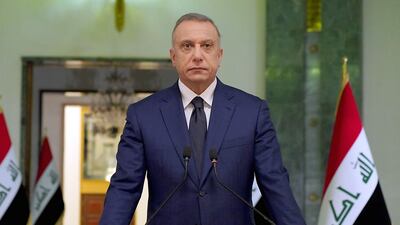Torture and extortion mired the work of a special government committee tasked with investigating corruption in Iraq under the administration of former prime minister Mustafa Al Kadhimi, the government said on Wednesday.
The government dismissed nine senior Interior Ministry officials as part of its investigation.
Shortly after taking office as interim prime minister in May 2020, former spy chief Mr Al Kadhimi established what is known as Committee 29, granting it special authority to investigate major corruption cases.
The now-defunct committee was headed by influential Interior Ministry official Lt Gen Ahmed Abu Ragheef, who served as deputy minister for intelligence and federal investigations.
It made several high-profile arrests of senior government officials and businessmen accused of corruption. Among them were the former director of the pension fund, the former president of the Baghdad Investment Commission, the former deputy electricity minister and the former director of the privately-owned electronic payment company Qi Card.
Critics of Mr Al Kadhimi, mainly Iran-backed Shiite political parties and militias, accused him of using Lt Gen Abu Ragheef’s committee to target opponents. Mr Al Kadhimi had troubled relations with pro-Tehran factions as he sought to rein them in.
Last December, the current Prime Minister Mohammed Shia Al Sudani ordered an investigation into alleged human rights offences perpetrated by the committee after a report by The Washington Post said it was using forms of torture to extract confessions.
On Wednesday, government spokesman Basim Al Awadi announced that the investigation found “shortcomings and human rights violations”.
"The probe committee recommended sending the file and all investigation papers to the judiciary, as there have been proven shortcomings," Mr Al Awadi said.
The spokesman only mentioned Lt Gen Abu Ragheef, eight other security officials and a police officer.
An Interior Ministry official told The National that three officers with the Iraqi National Intelligence Service and one civil servant from the Commission of Integrity were also involved.
One of the suspects is still at large, the ministry official said.
According to an internal report issued by the INIS, Lt Gen Abu Ragheef “knew about torture and extortion while heading the committee and didn’t take any legal action”, while other individuals were also complicit.
Since taking office in late October, Mr Al Sudani has been replacing government officials with others close to the Co-Ordination Framework, the biggest parliamentary bloc backing him. Influential Tehran-backed Shiite militias and political parties form the backbone of the CF.
Mr Al Awadi defended the investigation, saying it was conducted “away from any reprisal or inhumane practices”.
Corruption has become a major crisis in the political landscape of Iraq following the 2003 US-led invasion that toppled Saddam Hussein.
The country ranked 157 out of 180 in Transparency International's Corruption Perceptions Index in 2022.


